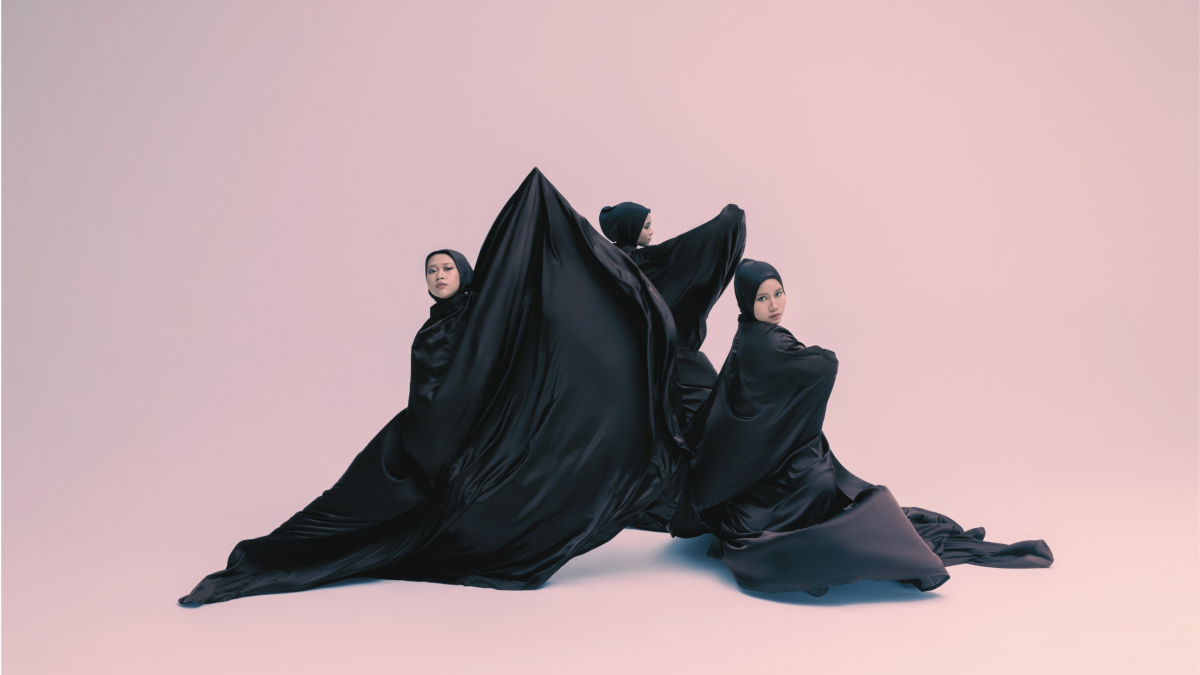On a light-drenched stage at the Trans Musicales festival in Rennes, France, Voice of Baceprot frontwoman Firda Marsya Kurnia wryly asked the audience: "Do you guys want to hear some fun facts?"
Since 2015, the all-girl Muslim trio has cemented its trailblazing hold on metal rock, a genre noted for headliners who are predominantly male, white, and Western, as well as themes and symbolism that reject—or at least question—religious doctrine.
During their first-ever European tour, Kurnia told the audience, journalists incessantly asked the band why they wore their hijabs and whether they were forced to. "It makes me feel like I'm coming here for a fashion show," Kurnia said to resounding boos.

Hailing the veil as a "sign of peace, love, and beauty," the 21-year-old vocalist added: "And if you ask me what we do if someone asks about our hijab, this is what we do."
Unflinching, she pointed behind her at drummer Euis Siti Aisyah, also 21, who played a brief set with Keith Moon-like vigor. Bassist Widi Rahmawati, 20, followed by riffing with swift but effortless grace.
A defiant Kurnia carried on: "And if you ask me again, 'Are you sure about your choice?' and what we do with our hijab, this is actually what we do with our hijab." She walked away from the mic to the crowd's roars, as Aisyah counted the band into their next song.
The viral TikTok, viewed at least 2.6 million times, ends there.
The band contends that too many press interviews have disregarded their artistry to relentlessly pick apart their Muslim backgrounds.
Rahmawati told Newsweek these "annoying" lines of questioning have made the band "uncomfortable" because "it looks like we are famous just because we are wearing hijab."
"And play rock," Kurnia added.
The group sees no clash between its devout Muslim identity and rockstar status. Quite the opposite, in fact.
"Since the beginning, we actually have a view that musical instruments are just tools and music is just a platform to express ourselves," Kurnia told Newsweek. "However, we feel that our spiritual life and faith becomes strengthened through music."
"Music is really related to personal faith," Aisyah said. "And our faith happened to be in rock music. Every time we listen to rock music, we feel an adrenaline rush that we can feel, but it's difficult to explain."
The women of VoB were initially catapulted to prominence as children in Singajaya, a rural village in the Garut regency of West Java.
In early performances at local festivals, the three girls' colossal stage presence radiated the nonplussed confidence and fluid dexterity of seasoned rockstars.
Even as teenagers, Voice of Baceprot's musical prowess—fed by a steady diet of personal heroes and YouTube video tutorials—seemed ages-old. Kurnia sings with an impressive range of gritty depth and high-pitched tones, rivaled only by her simultaneous guitar playing.
Rahmawati's supple wrists and deft fingers betray the heavy inspiration she drew from Red Hot Chili Peppers bassist Flea. And as Aisyah cleanly strikes her percussion set, she seems to have ascended to a world of her own, at home flanked by cymbals.
School Revolution
Much like many acclaimed rock bands, Voice of Baceprot was born from a schoolmates-turned-bandmates tale. Drummer Aisyah and vocalist Kurnia were friends since elementary school, eventually meeting bassist Rahmawati in junior high.
The three had initially been cast alongside 15 students for a musical drama led by teacher Abah Ezra, who would later become VoB's mentor. But as most kids did not obtain permission from their parents, the class was whittled down to seven students. And then there were three.
Ezra taught the girls basic instrument skills, talents they sharpened via YouTube. The band's early influences include System of a Down, Linkin Park, and Rage Against The Machine.
Aisyah cited South African YouTube drummer Cobus Potgieter as a personal inspiration, having learned the "slide" technique from him. This trick enables a drummer to achieve a double-pedal sound with only a single pedal, which proved to be an asset given the band's early lack of adequate musical equipment.
Rahmawati first learned to play bass on an acoustic guitar, at one point snapping a string while attempting to slap the instrument.
The band's success has since inspired an increase in orders of musical equipment for schools in Garut. "We are very happy about this because we think that the current generation has to have access to musical instruments," Rahmawati told Newsweek.
"Yeah, better than us," Kurnia added.
The band's path to prominence was not without hurdles. According to Rahmawati, the girls' parents were initially reluctant. VoB also faced criticism and threats. Kurnia said she once received a series of menacing letters.
One of them read: "You are beautiful but you will not live long." Another, which Kurnia said contained "hateful words," was left after a break-in at her mother's shop.
But as Voice of Baceprot grew louder, the opposing voices were progressively drowned out by exponentially swelling supporters. What began as scattered handfuls of headbanging metal enthusiasts soon turned into massive ecstatic crowds.

Following their breakthrough 2018 single "School Revolution," the band released "God Allow Me (Please) To Play Music" in August.
The lyrics address God while repeating affirmations such as "I'm not a criminal," "I'm not a corruptor" and "I'm not the enemy"—an unmistakable message to their most fervent religious critics.
On March 8, which marked International Women's Day, the band dropped their latest single "[NOT] PUBLIC PROPERTY," an anthem lauding body autonomy.
Only a few years on from their emergence, VoB saw the very rock legends they admired join their growing fanbase. The band was praised by Rage Against The Machine's Tom Morello, Flea of the Red Hot Chili Peppers, and Living Colour guitarist Vernon Reid.
In August 2022, the band is set to play Germany's Wacken Open Air, arguably the world's biggest international heavy metal festival. "We are very excited," Aisyah said. "Because it has been one of our biggest dreams for a long time."
'A Band With Principles'
As people, the band members of VoB seem almost perpetually in sync, from frequently speaking in unison to absorbing the world around them as a musical unit.
One of the many shared VoB experiences was the tone of surprise—that three veiled Muslim women could be talented and committed metal artists—which followed them throughout their now well-established careers.
"We don't want to be only seen as the Muslim hijabi rock trio," Rahmawati said. "Since the establishment of VoB, we want to be known as a band with principles and we want to make great musical works."
On par with the confrontational nature of metal, VoB's principles were not communicated subtly. In another widely-viewed TikTok video, a solemn Kurnia took time out of a gig at the Atelier des Môles in Montbéliard, France for a frank speech on sexual violence.
Speaking to Newsweek, Kurnia said the issue of sexual abuse resonates with the band because "patriarchal culture and the influence of power relations" in Indonesia's legal system renders it "difficult" for survivors to obtain justice.
"So we just want to help the victims with our way to get what they need, and also raise awareness that anyone can be a victim, or even a predator," she said.
Despite the difficulties they faced in their beginnings, the band has emerged from a country that is deeply fond of rock music. Indonesia boasts a vibrant heavy metal scene, with leading bands such as Burgerkill—also performing at Wacken—Deadsquad, and Hellcrust.
Indonesian President Joko Widodo, known for his love of metal, is reported to have once paid 11 million rupiahs ($763) for a rare Metallica album. During Voice of Baceprot's European tour, the Indonesian ambassadors to Belgium and the Netherlands happily threw up metal horn gestures in photo-ops with the band.
"Rock music or metal music in Indonesia is not only about playing music as loud or as fast as possible, but it also contains a message to bring people together despite our differences," Kurnia told Newsweek.
"So even though they have a title as president or as ambassador, or another important person, when we talk about music, we can sit together."
Throughout Voice of Baceprot's ascension to metal prestige, the world has heard from the band's thunderous fans and choir of critics. But the trio most enjoys listening to young Indonesian girls, who often "share their personal stories" with them via social media.
"Perhaps this is because they know that we are active in voicing out issues related to women's empowerment. We are also happy to hear their stories that they become aware [of] their rights," Kurnia said.
"That as women, we also have the same opportunity as men to become anything that we want to be, and our path should not be restricted just because we are women."
Uncommon Knowledge
Newsweek is committed to challenging conventional wisdom and finding connections in the search for common ground.
Newsweek is committed to challenging conventional wisdom and finding connections in the search for common ground.
About the writer
To read how Newsweek uses AI as a newsroom tool, Click here.








